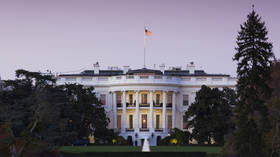Thick red line: India and Pakistan may have no peace in 2020, just the seeds of hope
Four events in 2019 portend profound changes in the future of India and Pakistan, neighboring nations umbilically tied by a very complex past. The impact of these events will surely spill over into 2020.
India, shaking off its ‘soft state’ image, sent war planes inside Pakistan to bomb what it alleged were jihadi training camps from which the Pulwama terror attack on February 14, 2019 – which killed 44 Indian soldiers – had been launched.
Delhi followed this up by removing Kashmir’s special status and integrating the state fully with the nation’s mainstream, in a stunning political manoeuvre.
Pakistan, a champion of the cause of Kashmir’s freedom from India, was far from looking at this positively.
In Pakistan, 2019 was the year the might of its military establishment was challenged. The country’s Supreme Court denied a three-year extension to Chief of Army Staff Qamar Javed Bajwa (Though later Pakistan's National Assembly passed bills to extend Bajwa's tenure).
Also, an Islamabad court sentenced former army chief and president Pervez Musharraf to death for treason. Even though the Pakistani government is to back Musharraf's appeal, it’s symbolic of the erosion of the military’s grip on the country.
These verdicts leave an invisible noose hanging over Pakistan’s military headquarters and its real power centre, Rawalpindi.
India eyes ‘promised land’ over peace
It is very unlikely that 2020 will be a year of peace overtures. Pakistan's military and the Khan government are still reeling from being caught on the hop by the Balakot surgical strike and by the flash removal of Kashmir’s special status. Domestically, Islamabad can ill afford to be seen as weak by being even more conciliatory towards India.
In India, if Narendra Modi shows no interest in leaving a legacy suited to liberal expectations, his closest aide and most powerful minister Amit Shah seems positively averse to it. Both want to restore India to its civilizationally commanding place and regaining ground lost over centuries of Islamic invasions and British colonization.
They will be in no hurry to seek peace with Pakistan.
After scrapping Kashmir’s special status under Article 370 of the Constitution, Shah has talked about getting back Pakistan-administered Kashmir and Gilgit-Baltistan, which India claims as its own. Pakistan’s Prime Minister Khan has been repeatedly warning his country against an Indian adventure.
Also on rt.com India & Pakistan trade accusations following deadly clash in Kashmir that killed at least 4, including Indian civilianWhy India can’t act like a cowboy
An aggressive India cannot cross red lines at will. It has so far managed to have international opinion in its favor – even from China and Islamic countries like Saudi and UAE. But it will have to wage a sustained and extremely savvy diplomatic war to stop the bilateral Kashmir issue from getting internationalized.
A sustained campaign by the Western media – often with an armory of fake news – depicting India’s new Citizenship Amendment Bill as being anti-Muslim, is also a PR battle it has to keep fighting.
But India may covertly play on Pakistan’s fault lines in Balochistan, Gilgit-Baltistan, Sindh and Khyber Pakhtunkhwa, backing separatist movements in these places, just as it alleges Pakistan meddled in Kashmir and in the India-wide protests over the new citizenship law.
Pakistan has a silver lining in chaos
Pakistan’s domestic politics is at a historic crossroads. For the first time, there has been a serious judicial and political challenge to its all-powerful military establishment.
Meanwhile, there was some good news for Pakistan’s economy in 2019, such as new investment from China, Saudi Arabia and the United Arab Emirates. As a result, Pakistan’s foreign reserves increased from US$7.6 billion to US$9.4 billion in eight months.
Balance of payments problems eased, even if very slowly. It was checked by credit rating agency Moody’s, which switched its economic outlook for Pakistan from Negative to Stable.
Also on rt.com Indian Sikhs protest at Pakistan’s diplomatic mission over hateful altercation in front of major Sikh siteAlso, Pakistan has recently avoided terrorism-related sanctions, and would probably like to keep avoiding them. All that could give the generals pause and reason to hold off from any power-grabs that would knock the feet from under their country again.
Under the current bilateral mechanism, India has been speaking to those with a gun held to their heads rather than to those holding the gun. Democratically elected governments have been repeatedly overthrown by the military and no Pakistani PM has completed his or her full five-year term.
India would welcome a stronger government in Pakistan; perhaps the only sure-fire way for the two nations to improve relations.
India-China dynamics to change?
In 2020, India and China will observe the 70th anniversary of their diplomatic ties as the “year of India-China cultural and people-to-people exchanges.”
PM Modi and Chinese President Xi Jinping have decided on 70 such activities next year including cultural, religious and trade promotion events, as well as military exchanges.
Also on rt.com India PM Modi points finger at Pakistan over ‘persecution’ of minorities as he defends new citizenship lawIf 2020 brings the two Asian powers closer, Pakistan’s friend zone with China may get squeezed. On the brighter side, India may get China to prevail on Pakistan on certain contentious issues, and vice versa.
Overall, 2020 is unlikely to be a year of peace between India and Pakistan. But there are seeds of hope and change for the long term.
If you like this story, share it with a friend!
The statements, views and opinions expressed in this column are solely those of the author and do not necessarily represent those of RT.















